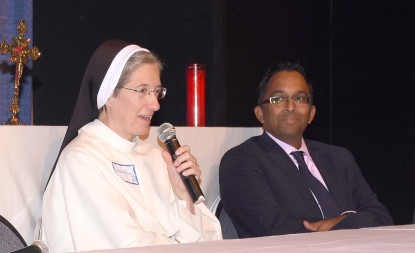September 28, 2016 // Local
Medical community formally opposes physician-assisted suicide

Sister Mary Diana Dreger, a Dominican Sister of the Saint Cecelia Congregation in Nashville, Tenn., and internal medicine physician, and Dr. Ashley Fernandes, associate director of the Center for Bioethics and Medical Humanities at The Ohio State University College of Medicine, discuss the ways in which the faith of Catholic medical professionals should lend themselves to the protection of human dignity at MedCon. The Sept. 24 conference for medical professionals, which took place in Fort Wayne, investigated the ways in which faith should inform a medical professional’s work and presented life-affirming treatment techniques.
By Stephanie A. Patka
During its yearly convention in Indianapolis on Sept. 25, the Indiana State Medical Association voted to formalize its opposition to physician-assisted suicide
The annual convention of the ISMA has an attendance of over 150 physicians who represent the approximately 8,000 physician members from all over the state of Indiana. The convention is a time when members initiate legislation on behalf of other physicians. Resolutions adopted during the convention are sent to state representatives. This year, among the many resolutions discussed, two opposing resolutions were debated regarding the issue of physician-assisted suicide. The first resolution advocated that the ISMA adopt a position supporting PAS, and the second resolution advocated for a position against PAS.
There was passionate debate from both sides, with the vast majority of physicians testifying strongly for ISMA to oppose any attempt to legalize PAS in Indiana. The issue itself was, by far, the most debated resolution that was discussed, causing the meeting to run over due to the many physicians that wanted to speak out against PAS.
The American Medical Association is currently studying this issue on a national level. PAS has been legalized in Oregon (1994), Washington (2008) Vermont (2013), California (2015), and by statute and by court decision in Montana (2009).
Those doctors who spoke in favor of PAS argued that physician-assisted suicide decreases health care costs at the end of life; that it helps patients who commit suicide to die in a more peaceful manner; and since other states have legalized it, some patients might like it here in Indiana.
Many of the first-time conference attendees, however, attended specifically for the purpose of testifying against PAS. Physicians opposed to PAS addressed the crowd, arguing that medical professionals should focus on providing care and comfort to patients — not becoming a source of lethal drugs. Patients would not want their doctors to have the power to suggest suicide to them as an option.
Dr. Eustace Fernandes, a Fort Wayne pulmonary and critical care physician, was present at the meeting and testified against physician-assisted suicide. He cited the conflict of interest that PAS creates.
“Physician-assisted suicide represents a fundamental transformation of the doctor-patient relationship,” Fernandes stated. “The doctor’s role would be altered from healer to occasional executioner. It would prey upon the most vulnerable in our society: the poor, the disabled and the mentally ill.”
Other physicians brought into question how the interaction of government and insurance companies might interfere with care of patients. Insurance companies pay for cancer treatments that cost thousands of dollars; however, this cease to be the case when they have the option of paying for the cheaper option of lethal drugs, which only costs a few hundred dollars. Real-life examples were cited of patients in Oregon who received letters from insurance companies refusing to pay for chemo and suggesting PAS as an alternative ‘treatment’ for cancer.
Cancer was not the only medical condition patients could be ailing from that might trigger a prescription of physician-assisted suicide. Diabetes is now considered a terminal disease that would qualify for PAS in Oregon.
Testifying physicians also noted that everyone knows someone who has been misdiagnosed or outlived a terminal diagnosis. For those who suffer from depression and feel like they want to die, treatment could include PAS. While sharing empathy for those patients in pain, many physicians spoke to the fact that nearly all pain is now treatable. They recommended that any patient in pain should find a new doctor.
The legalization of physician-assisted suicide in other states has impacted societal issues. With the legalization of assisted suicide as a “good for society,” general suicides have risen dramatically. Additionally, any person could have a family member die from taking lethal drugs and not know about it until he or she is dead, because no family notification is required in advance.
Questions regarding abuse were also raised. A relative who is an heir to the patient’s estate, or an abusive caregiver, can pick up the lethal drugs and administer them without the patient’s knowledge or consent. There is no oversight and no witnesses are required once the drugs leave the pharmacy. Assisted suicide is a recipe for elder and disability abuse because it can put lethal drugs in the hands of abusers. Any safeguards set up to protect vulnerable patients from coercion to submit to PAS will erode, as evidenced in the countries where PAS has been practiced for nearly 30 years, including Belgium and the Netherlands. Half of PAS nurses in those countries admit to euthanizing a patient without consent.
Dr. Andrew Mullally, a family medicine physician at Credo Family Medicine in Fort Wayne and a delegate of the Young Physician’s Society, also attended the ISMA convention to speak out against physician-assisted suicide.
“For 2,500 years, physicians have professed the Hippocratic Oath, which explicitly forbids physician-assisted suicide. The cornerstone of medical ethics, ‘primum non nocere’ (first, do no harm) is essential to the physician’s role as healer,” he said. “Ultimately, the cure for suffering is not to eliminate the sufferer, but rather to comfort him and stand with him in solidarity when he is ill.”
Both Mullally and Fernandes are members of the local Dr. Jerome Lejeune Catholic Medical Guild of Northeast Indiana. Fernandes expressed his gratitude for the outcome of the convention. “The ISMA has taken a bold step in reaffirming the physician’s role in protecting human life and comforting when we cannot heal.”
Bishop Kevin C. Rhoades, of the Diocese of Fort Wayne-South Bend, agreed. “It was very good news to hear that the Indiana State Medical Association has voted against physician-assisted suicide,” he said, upon the hearing the voting results. “I am deeply grateful to the many physicians, including those from our diocese, who spoke at the convention against physician-assisted suicide. Physician-assisted suicide abandons vulnerable individuals and wrongly communicates that some lives are not worth living. We must cherish the lives of the terminally ill and provide them the spiritual, emotional, and physical care that honors God’s gift of life. I am grateful that most physicians in Indiana recognize their duty to respect and protect the lives of their patients. I pray that their example will inspire others in our culture to have a renewed reverence and care for the lives of the seriously ill and the dying and for all human life.”
The best news. Delivered to your inbox.
Subscribe to our mailing list today.






